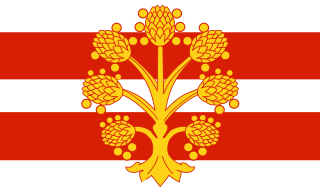See also
- Kerby
- Kerby (name)
- Kirby
- Kirby (surname)
- Kirkjubæjarklaustur, a place name in Iceland with a parallel etymology and meaning
Kirkby is a northern English name of Scandinavian origin, meaning "church town". It may refer to:

Cumbria is a ceremonial county in North West England. It borders the Scottish council areas of Dumfries and Galloway and Scottish Borders to the north, Northumberland and County Durham to the east, North Yorkshire to the south-east, Lancashire to the south, and the Irish Sea to the west. Its largest settlement is the city of Carlisle.
Burton, Burtons, or Burton's may refer to:

Westmorland is a historic county in North West England. People of the area are known as Westmerians. The area includes part of the Lake District and the southern Vale of Eden.

Kendal, once Kirkby in Kendal or Kirkby Kendal, is a market town and civil parish in the unitary authority of Westmorland and Furness, England. It lies within the River Kent's dale, from which its name is derived, just outside the boundary of the Lake District National Park.
Dee or DEE may refer to:
Rodgers is a patronymic surname deriving from the given name of "Rodger" commonly used by the Normans and meaning "son of Rodger". Variant form of Rogers.
Welton may refer to:
Marton may refer to:

The Barony of Kendal is a subdivision of the English historic county of Westmorland. It evolved from one of two ancient baronies that make up the county, the other being the Barony of Westmorland. In 1974, the entire county became part of the modern county of Cumbria and ceased to have an administrative function. At the same time, Kendal borough along with some other rural and urban districts in Westmorland was merged with the neighbouring parts of Lancashire, Furness and Cartmel, and also the Sedbergh Rural District of the West Riding of Yorkshire into the new South Lakeland district of the new county.
John Kirby may refer to:
Richard Kirby may refer to:
Kirk is found as an element in many place names in Scotland, England, and North America. It is derived from kirk, meaning General Assembly ”Government” and "Church". In Scotland, it is sometimes an English translation from a Scots Gaelic form involving cille or eaglais, both words for 'church'. Rarely it is found in Anglicisations of Continental European placenames which originally had Dutch kerk or a related form.
Kirby is a surname of Scandinavian then Irish and English origin. Names ending in 'by' are Nordic like the place names in Sweden such as Visby, Hellingsby etc. The Irish surname is an anglicisation of Ó Ciarmhaic, is Kerwick, while the English surname is from the Old Norse "kirkja" + "býr" meaning "church" + "settlement". Notable people with the surname include:
Holland is an English habitational name from Holland, a division of Lincolnshire, or any of the eight villages in various parts of England so called, from Old English hōh ‘ridge’ + land ‘land’.
Bethell is an English surname, from a medieval diminutive of the personal name Beth, which in turn is derived from Elizabeth. It can also be a Welsh surname, from the given name Ithael. It has variations Bithell and Bythell. Notable people with the surname include:
Harrington is an English habitational name from places in Cumbria, Lincolnshire, and Northamptonshire. It is also a common surname in southwest Ireland, where it was adopted as an Anglicized form of the Gaelic surnames Ó hArrachtáin and Ó hIongardail. Notable people with the surname include:
The surname Kendall, Kendl, or Kendal has two widely accepted origins. The first is from the market town of Kendal in Cumbria. The earliest recorded form of this town's name is in 1095 as Kircabikendala, literally "Church by Kent dale". The second is as an anglicization of Middle Welsh Kyndelw, a given name, as in Cynddelw Brydydd Mawr.
Coates is an English and Scottish surname.
Kerby is both a surname and a given name. Notable people with the name include:
Smart is a surname.